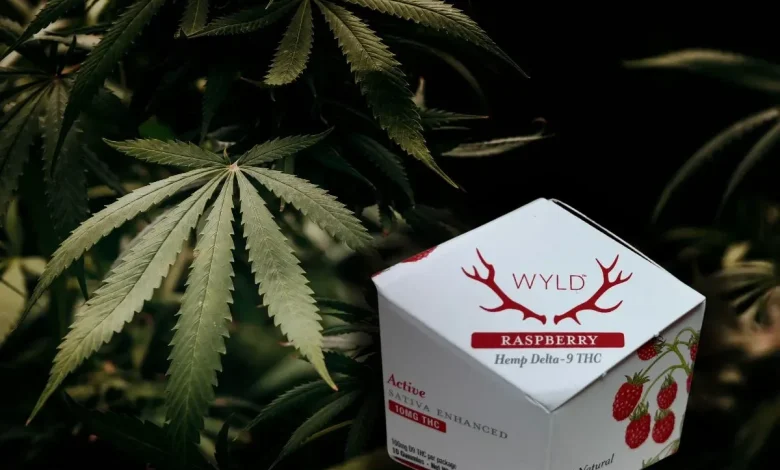Wyoming hemp vendors reel from Delta-8 court loss, new federal ban

Smoke shops and other businesses that sell hemp products in Wyoming confronted a tough future this week after Republicans in the U.S. Senate inserted a ban on most THC-products derived from hemp into the bill that ended the federal shutdown.
Though hemp advocates have a year to advocate for its reversal, the measure represented a substantial blow to an industry already reeling from a recent court ruling. The 10th Circuit Court of Appeals upheld a Wyoming-specific ban on certain THC derivatives just two weeks ago.
With products containing the THC derivative Delta-8 off the table in Wyoming, hemp vendors were looking toward the sale of edibles and beverages containing hemp-derived THC to make up the sales.
But beginning a year from now, the federal government will ban any hemp product that carries more than 0.4 milligrams of THC. Hemp is a derivative of the cannabinoid plant, as is marijuana. Hemp has a wide range of uses, from the making of rope and clothing to the production of CBD, a non-intoxicating and widely used supplement.
A hemp crop growing at a farm in Albin near the Nebraska border. (Joshua Egle)
Under Wyoming law, hemp plants are legal as long as their THC concentration remains under 0.3%. At such a concentration, the plant itself would not get a user high if it were smoked.
But some shops still sell products with higher concentrations in the final product itself — drinks and edible gummies can carry 10 milligrams of hemp-derived Delta-9 THC or more. Those are concentrations equivalent to some marijuana products sold over the border in Colorado, where the drug is legal. The THC in Wyoming comes from hemp and not marijuana, and some shops are operating on an interpretation of the laws that says it’s the strength of THC in the hemp plant itself, not in the substance in which it is packaged, that matters.
The federal ban would end that practice. The language passed into law outlaws a concentration of more than 0.4 milligrams THC in the final container handed to the consumer, meaning all the liquid in a soda can or chocolate bar must have a total concentration below 0.4%.
Changing laws, changing products
Since the federal government legalized hemp production in the 2018 Farm Bill, vendors in Wyoming and the dwindling number of other states where marijuana itself remains illegal have been playing what is essentially a game of whack-a-mole with regulators and lawmakers.
The new ban comes just weeks after a federal appeals court in Denver upheld a law passed by the Wyoming Legislature that outlawed the THC derivative Delta-8. Since 2019, when Wyoming legalized the sale of hemp products, stores around the state had built up a thriving trade in Delta-8 products, which are intoxicating. In 2024, however, after reports emerged from Cody of a handful of students getting sick after consuming Delta-8, state lawmakers outlawed that substance as well as two other popular THC derivatives.
That ban was a blow to vendors in the state, who say the products were mischaracterized as “synthetic” versions of cannabis when they remained natural derivatives of the plant. They were popular among consumers, shop owners say.
“Before the ban, roughly 70% of our sales came from those cannabinoids,” Alicia Watt, a founder of Platte Hemp Company, which was one of the plaintiffs in the lawsuit against the Delta-8 ban, wrote in a statement to WyoFile. “That hit every hemp retailer and grower in the state hard — from small storefronts to hardworking Wyoming hemp farmers who invested everything into a once-legal crop.”
Another plaintiff in the lawsuit, Justin Arnold, part of the husband-and-wife team behind Cin D’s CBD shop in Torrington, told WyoFile he was selling around $20,000 a month of Delta-8 products before lawmakers banned it. He estimated those sales would have doubled in another year. Arnold imposed an age limit of 21 years old for Delta-8 customers, though the law actually allowed sales to people 18 and up.
Delta-8 products had become top sellers in smoke shops across Wyoming before their ban. (Madelyn Beck/WyoFile)
His products helped cancer patients and other people struggling with chronic pain, he said, without forcing them to drive to Colorado to buy weed legally and then illegally bring it into Wyoming. “If you’re buying hemp in Wyoming, you’re not buying weed in Colorado, you’re not going to the doctor and you’re not going to the bar,” he said.
To Arnold, this week’s sudden legislative action in Washington, which was pushed by Kentucky Republican Sen. Mitch McConnell, was another example of powerful influences like the legalized cannabis industry and pharmaceutical lobbyists trying to oppress a competitor that is largely made up of small business owners.
McConnell was an architect of the 2018 bill legalizing hemp production. But he has since grown concerned about the practical effects of the bill. “My 2018 hemp bill sought to create an agricultural hemp industry, not open the door to the sale of unregulated, intoxicating, lab-made, hemp-derived substances with no safety framework,” McConnell said this summer, according to the Cannabis Business Times.
Officials with the U.S. Hemp Roundtable, a national industry group, predict that if the ban is not unwound within the year it will wipe out 98% of a hemp industry worth $28 billion. The group is instead trying to lobby lawmakers to pass legislation that does not ban higher THC quantities but instead regulates production practices to keep out harmful chemicals and outlaw marketing and sales practices that target minors.
Lawsuit fails
In the Wyoming court case, Watt, Arnold and their fellow plaintiffs sought to show that regulating Delta-8 was the province of the federal government, not the state, among other legal arguments. Federal judges disagreed with them, first in the U.S. District Court of Wyoming and then at the appeals court in Denver.
Platte Hemp Company now sells Delta-9 gummies that are under 0.3% THC, as well as other legal herbal products and glass smoking devices — the traditional and long-running wares of “head shops” in Wyoming and other states. Wyoming lawmakers need to better educate themselves on hemp and cannabis, the difference between the two plants and their respective uses, before passing more legislation, Watt said.
“Both offer legitimate medical value and industrial benefit, from fiber and textiles to seizure control and pain relief,” she wrote. “Instead of supporting natural medicine and Wyoming’s own hemp farmers, our state is protecting Big Pharma and alcohol.”
At least one plaintiff from the Delta-8 lawsuit has decided the regulatory uncertainty makes it too difficult to run a business. Owners of the Green Room, which describes itself as Casper’s first hemp dispensary, posted a notice to their website saying they’d be closing at the end of this year. “This has been a difficult decision for us, but the law changes have put us into a position where we can no longer stay in business,” the notice said.
An owner of the business declined to comment to WyoFile.





